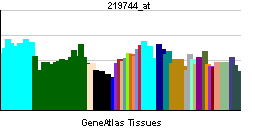FN3K
Jump to navigation
Jump to search
| Fructosamine 3 kinase | |||||||||||
|---|---|---|---|---|---|---|---|---|---|---|---|
| Identifiers | |||||||||||
| Symbols | FN3K ; | ||||||||||
| External IDs | Template:OMIM5 Template:MGI HomoloGene: 23336 | ||||||||||
| |||||||||||
| RNA expression pattern | |||||||||||
 | |||||||||||
| More reference expression data | |||||||||||
| Orthologs | |||||||||||
| Template:GNF Ortholog box | |||||||||||
| Species | Human | Mouse | |||||||||
| Entrez | n/a | n/a | |||||||||
| Ensembl | n/a | n/a | |||||||||
| UniProt | n/a | n/a | |||||||||
| RefSeq (mRNA) | n/a | n/a | |||||||||
| RefSeq (protein) | n/a | n/a | |||||||||
| Location (UCSC) | n/a | n/a | |||||||||
| PubMed search | n/a | n/a | |||||||||
Fructosamine 3 kinase, also known as FN3K, is a human gene.[1]
FN3K catalyzes phosphorylation of fructosamines formed by glycation, the nonenzymatic reaction of glucose with primary amines followed by Amadori rearrangement. Phosphorylation of fructosamines may initiate metabolism of the modified amine and result in deglycation of glycated proteins (Delpierre et al., 2000).[supplied by OMIM][1]
References
Further reading
- Delpierre G, Rider MH, Collard F; et al. (2000). "Identification, cloning, and heterologous expression of a mammalian fructosamine-3-kinase". Diabetes. 49 (10): 1627–34. PMID 11016445.
- Szwergold BS, Howell S, Beisswenger PJ (2001). "Human fructosamine-3-kinase: purification, sequencing, substrate specificity, and evidence of activity in vivo". Diabetes. 50 (9): 2139–47. PMID 11522682.
- Delpierre G, Collard F, Fortpied J, Van Schaftingen E (2002). "Fructosamine 3-kinase is involved in an intracellular deglycation pathway in human erythrocytes". Biochem. J. 365 (Pt 3): 801–8. doi:10.1042/BJ20020325. PMID 11975663.
- Strausberg RL, Feingold EA, Grouse LH; et al. (2003). "Generation and initial analysis of more than 15,000 full-length human and mouse cDNA sequences". Proc. Natl. Acad. Sci. U.S.A. 99 (26): 16899–903. doi:10.1073/pnas.242603899. PMID 12477932.
- Delpierre G, Van Schaftingen E (2004). "Fructosamine 3-kinase, an enzyme involved in protein deglycation". Biochem. Soc. Trans. 31 (Pt 6): 1354–7. doi:10.1042/ Check
|doi=value (help). PMID 14641062. - Ota T, Suzuki Y, Nishikawa T; et al. (2004). "Complete sequencing and characterization of 21,243 full-length human cDNAs". Nat. Genet. 36 (1): 40–5. doi:10.1038/ng1285. PMID 14702039.
- Delpierrre G, Vertommen D, Communi D; et al. (2004). "Identification of fructosamine residues deglycated by fructosamine-3-kinase in human hemoglobin". J. Biol. Chem. 279 (26): 27613–20. doi:10.1074/jbc.M402091200. PMID 15102834.
- Delplanque J, Delpierre G, Opperdoes FR, Van Schaftingen E (2004). "Tissue distribution and evolution of fructosamine 3-kinase and fructosamine 3-kinase-related protein". J. Biol. Chem. 279 (45): 46606–13. doi:10.1074/jbc.M407678200. PMID 15331600.
- Conner JR, Beisswenger PJ, Szwergold BS (2004). "The expression of the genes for fructosamine-3-kinase and fructosamine-3-kinase-related protein appears to be constitutive and unaffected by environmental signals". Biochem. Biophys. Res. Commun. 323 (3): 932–6. doi:10.1016/j.bbrc.2004.08.181. PMID 15381090.
- Gerhard DS, Wagner L, Feingold EA; et al. (2004). "The status, quality, and expansion of the NIH full-length cDNA project: the Mammalian Gene Collection (MGC)". Genome Res. 14 (10B): 2121–7. doi:10.1101/gr.2596504. PMID 15489334.
- Conner JR, Beisswenger PJ, Szwergold BS (2005). "Some clues as to the regulation, expression, function, and distribution of fructosamine-3-kinase and fructosamine-3-kinase-related protein". Ann. N. Y. Acad. Sci. 1043: 824–36. doi:10.1196/annals.1333.095. PMID 16037310.
- Delpierre G, Veiga-da-Cunha M, Vertommen D; et al. (2006). "Variability in erythrocyte fructosamine 3-kinase activity in humans correlates with polymorphisms in the FN3K gene and impacts on haemoglobin glycation at specific sites". Diabetes Metab. 32 (1): 31–9. PMID 16523184.
- Szwergold BS (2007). "Fructosamine-6-phosphates are deglycated by phosphorylation to fructosamine-3,6-bisphosphates catalyzed by fructosamine-3-kinase (FN3K) and/or fructosamine-3-kinase-related-protein (FN3KRP)". Med. Hypotheses. 68 (1): 37–45. doi:10.1016/j.mehy.2006.06.030. PMID 16920277.
| This protein-related article is a stub. You can help Wikipedia by expanding it. |